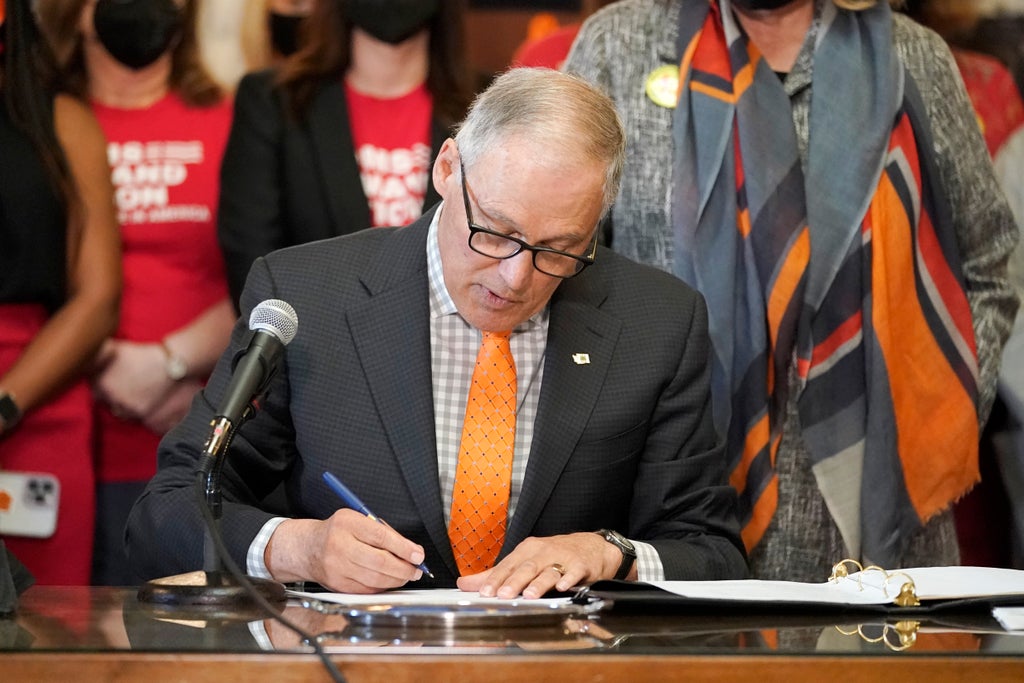
Washington Gov. Jay Inslee signed a package of bills Wednesday tightening the state's gun laws, including a measure that bans the manufacture, distribution and sale of firearm magazines that hold more than 10 rounds of ammunition.
Washington joins nine other states, including California and New Jersey, that restrict magazine capacity size.
“We are not willing to accept gun violence as a normal part of life in the state of Washington,” Inslee, a Democrat, said at a news conference in the Capitol’s state reception room, where he was surrounded by lawmakers and other supporters of the new laws.
The Capitol was closed to the public for several hours before and after the bill signing. A spokesperson for the Washington State Patrol said that there was no specific threat, but that the temporary closure was a “prudent precaution.”
Washington's measure, which takes effect July 1, does not prohibit the possession of such magazines. It also includes exceptions to magazine limits for law enforcement and corrections officers, members of the armed forces, Washington’s National Guard and for licensed firearms dealers who sell to those institutions.
Violations would be a gross misdemeanor, which in Washington is punishable by up to 364 days in county jail, a maximum fine of up to $5,000, or both.
The measure was requested by Democratic Attorney General Bob Ferguson, who said that a 2016 shooting at a party in Mukilteo — in which a 30-round magazine was used, killing three teens and seriously injuring another — and his conversations with the parent of a survivor motivated him to push for the bill every year since.
“It’s individuals who are directly impacted by gun violence. When they speak, politicians respond,” Ferguson said.
The new law also makes the sale or offering for distribution or sale of a prohibited magazine a violation of Washington’s Consumer Protection Act, which allows the attorney general’s office to take action on alleged violations of the act to get restitution and civil penalties.
In a statement issued after the bill signing, the Sacramento, California-based Firearms Policy Coalition said that it plans to lead a lawsuit over the new law, saying that it “condemns this latest act of state aggression and will not allow this law to go unchallenged.” The group said it was looking for Washington residents who could be potential plaintiffs in the planned action.
Inslee also signed a measure that prohibits people from knowingly bringing weapons — either openly carried or carried with a concealed pistol license — to ballot counting sites and on-campus school board meetings. The new law also bans openly carried firearms at local government meetings and election-related facilities such as county election offices, off-campus school board meetings and local government meetings, though people who have concealed pistol licenses would be allowed to carry their concealed weapon in those locations.
Firearms are already prohibited at several designated places statewide, including restricted areas of jails, courtrooms, taverns and commercial airports. And last year, lawmakers approved a ban on openly carrying guns and other weapons at the Washington state Capitol, part of the Capitol campus and public protests statewide.
“No one — no one — should be prevented from accessing their government due to fear of armed intimidation,” said Democratic Rep. Tana Senn, the bill’s sponsor.
Law enforcement is exempt from the restrictions, as are any security personnel hired at a location.
Violation of the law would be a misdemeanor, punishable by up to 90 days in jail and fines of up to $1,000. Second or subsequent violations would be a gross misdemeanor.
Additionally, any person convicted would have their concealed pistol license revoked for three years.
Under the measure, a person must knowingly be in violation of the law in order for the criminal penalty to apply.
A third measure signed by Inslee on Wednesday adds further restrictions to current law prohibiting the manufacture, sale, or possession of so-called “ghost guns” by prohibiting people from possessing components to build an untraceable firearm, as well as possessing any firearms built after 2019 that don’t have serial numbers. Hobbyists will be able to continue making guns at home, but under the new law they must use components with serial numbers.







